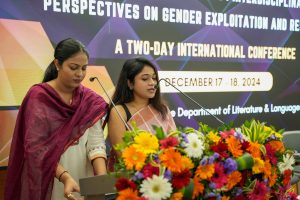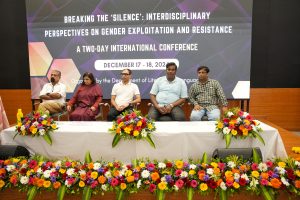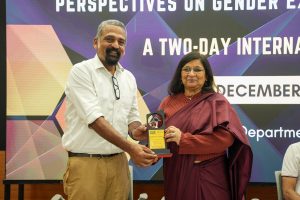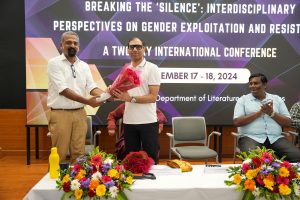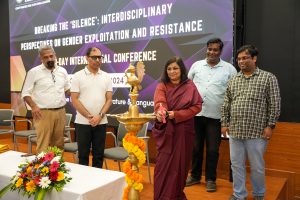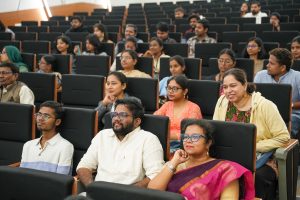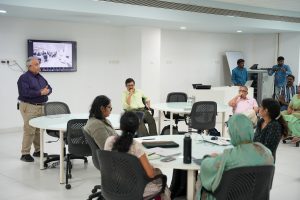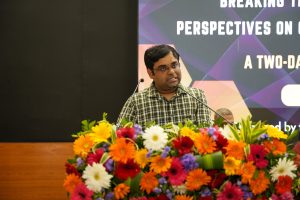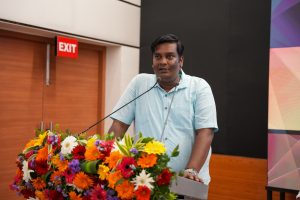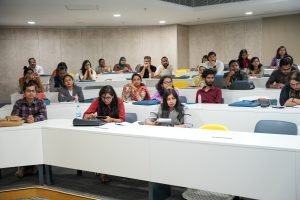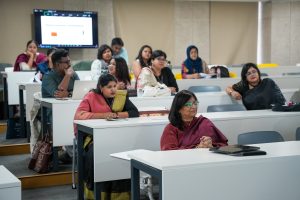Developing a High Gain Bi-directional Converter to Improve Efficacy in EV Applications

Electronic Vehicles (EVs) are a key element of carbon emission reduction strategies and pivotal to contributing to sustainable development. Operating solely on electrical energy, eliminating the need for petrol or diesel, EVs leave a significantly reduced carbon footprint compared to fossil fuel-powered vehicles. Underscoring the impact of EVs on the environment, advanced research is conducted to improve the efficacy and reliability of EVs.
On this note, a research team from the Department of Electrical and Electronics Engineering – Dr Tarkeshwar Mahto, Dr Somesh Vinayak Tewari, Dr Ramanjaneya Reddy and PhD scholar Ms K Mounika Nagabushanam has published a paper titled “High Gain Bi-directional KY converter for low power EV Applications” in the Q1 journal Energy having an Impact Factor of 9. Their research work focuses on the development of a bi-directional DC-DC converter that can be used in EVs for integration of battery to traction motor.
Abstract
In electric vehicles (EVs), the type of electric motor and converter technology have a significant impact on regulating the operational characteristics of the vehicle. Therefore, in this work, the modified bi-directional KY converter (BKYC) is proposed for EV applications. The main contributions of the proposed converter are high step-up/step-down conversion gain, bi-directional power flow, simplified control structure, continuous current, common ground, low volume, and high efficiency. An inductor on either side of the converter ensures continuous current flow and passive components are arranged to operate in series to offer high step-up/step-down conversion. The charging and discharging operations, steady-state analysis, and design process of the proposed converter are discussed in detail and compared with similar bi-directional converter topologies. Further, the efficiency analysis of the proposed converter is presented, and it was found that the efficacy is 95.51% in the charging operation and 96.52% in the discharging operation. The simulations are carried out using MATLAB/Simulink environment. Further, a prototype of a modified bi-directional KY converter is implemented with a TMS320F28335 processor and validated with theoretical and simulation counterparts.
Explanation of the Research in Layperson’s Terms
Electric vehicles (EVs) are built with traction motors, charging circuits, energy storage devices, and lighting systems. Each runs at a different voltage and has a different power level. Various power electronic converters are used to integrate the individual components of an electric vehicle. An electric vehicle (EV) runs primarily on battery power, which can be obtained from on-board charging or charging stations. The battery has a voltage range of 24 to 48 volts. The traction motor, coupled to a DC link bus with a voltage range of 400V to 600V, needs to receive this energy. Consequently, it is necessary to integrate a power converter to raise the voltage from lower voltage batteries to a higher voltage DC link. Additionally, energy lost during motor running can be used to charge batteries to improve the efficiency of the electric vehicle. Therefore, a separate power electronic converter is required for the power flow from the motor to the battery. The primary output of our study is the development of a bi-directional DC-DC converter that facilitates power flow from the battery to the motor and motor to the battery with the necessary voltage gains while maintaining improved efficiency and low cost.
The main challenges in EV technology are battery deterioration due to frequent charging and discharging and the volume of the power converter. The research team plans –
- To work on the noise reduction methods that are brought on by regeneration action
- To work on various control techniques to keep the DC link voltage of the propulsion system constant
- Published in Departmental News, EEE NEWS, News, Research News
Empowering Innovation at the 2nd Research Scholars’ Summit
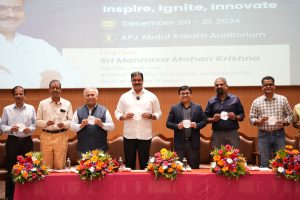 The varsity concluded the second edition of its distinguished Research Scholars’ Summit. This two-day summit witnessed the participation of 27 universities from the states of Andhra Pradesh and Telangana, resulting in a total of 243 abstract submissions.
The varsity concluded the second edition of its distinguished Research Scholars’ Summit. This two-day summit witnessed the participation of 27 universities from the states of Andhra Pradesh and Telangana, resulting in a total of 243 abstract submissions.
The summit delved into four major thematic areas namely: Engineering and Technology; Medicine, Life Sciences, Agriculture and Fisheries; Management, Social Sciences, Humanities, and Applied Sciences, including Computational Physics. Each thematic area encompassed a variety of subtopics.
The academic colloquium featured the esteemed presence of Shri Mannava Mohan Krishna, Honourable Chairman of Andhra Pradesh Technology Services, who graced the occasion as the chief guest. He expressed his vision for collaborative efforts with the researchers, stating, “We want to work with you, partner with you to serve the people better.” Shri Mohan Krishna also highlighted the Chief Minister, Shri N Chadraababu Naidu’s ambition to transform Andhra Pradesh into a technological hub, asserting that summits of this nature represent a commendable starting point. He also referred to the 153 services set to be launched under the WhatsApp Governance initiative by the government of Andhra Pradesh, stating that ideas such as these demonstrate how technological advancements benefit governance and thereby the society.
Prof. Manoj K. Arora, Vice Chancellor, SRM University-AP in his address, reminded the students that this summit serves as a platform for the exchange of ideas and offers a significant opportunity to the researchers for career progression. He emphasised SRM AP’s impressive research trajectory, stating, “in just seven and a half years since its inception, the university has established its presence on the scientific landscape.” While acknowledging the rise in research fervour, he urged attendees to prioritise the societal impact of their work stating that their PhD should symbolise Passion, Hard Work, and Dedication rather than a simple Doctor of Philosophy.
He encouraged students to meticulously frame their professional futures, he said “During your five years at the university, you should aspire to discern the path you wish to pursue—whether as educators, researchers, or entrepreneurs and the university will facilitate all the necessary resources to support your professional journey.” He also extended invitation to the scholars from other universities to come forward and use the infrastructure and facilities that SRMAP has invested in for Research.
The summit showcased a myriad of multidisciplinary research presentations from scholars culminating in the awarding of 18 gold medals, 14 silver medals and several special mention awards across various categories for their exemplary contribution. The success of the summit was further supported by the efforts of the convenors, Dr Sibendu Samanta, Dr Jatis Kumar Dash, and Mr Manikanta Bandlamudi, whose guidance and organisation were instrumental in creating a platform for scholarly exchange and collaboration.
Prof. Ranjit Thapa, Dean – Research, delivered the vote of thanks, expressing gratitude to all participants, organisers, and attendees. The summit culminated in a fruitful and awe-inspiring work showcasing dedication and perseverance and a promise to keep inspiring, igniting and innovating.
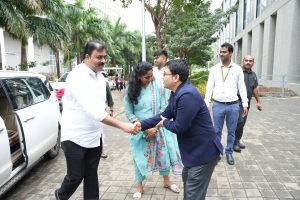
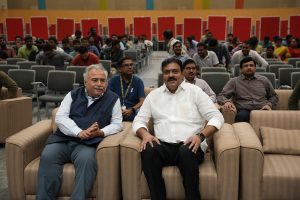
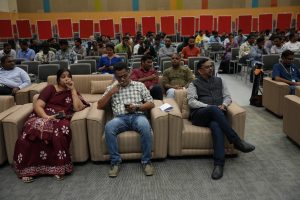
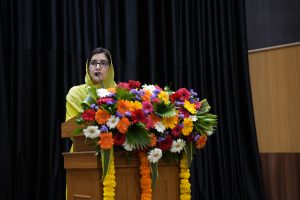
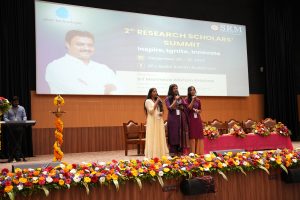
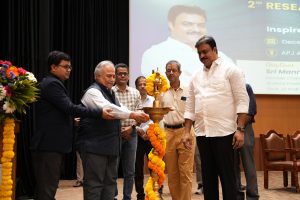
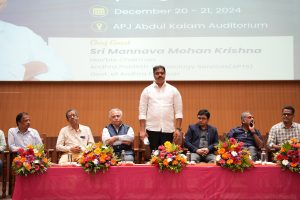
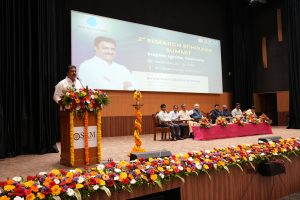
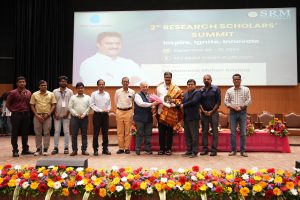

- Published in News, Research News
Two-day International Conference on Gender Exploitation Concludes
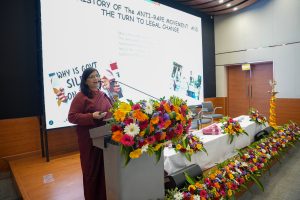 The two-day international conference on Breaking the Silence: Interdisciplinary Perspective on Gender Exploitation and Resistance organised under the auspices of SRM University-AP comes to a conclusion.
The two-day international conference on Breaking the Silence: Interdisciplinary Perspective on Gender Exploitation and Resistance organised under the auspices of SRM University-AP comes to a conclusion.
The international conference drew diverse audiences of academicians, academic experts, research scholars and students from across the country and outside, and featured talks by eminent academicians as Prof. Anita Singh, Department of English, Banaras Hindu University, Varanasi; Prof. Rajinder Dudrah, Professor of Cultural Studies and Creative Industries, Birmingham City University; Prof. Geetanjali Gangoli, Department of Sociology, Durham University; Prof. Nalini Iyer, Department of English, Seattle University; Prof. Priyanka Tripathi , Department of Humanities and Social Sciences, Indian Institute of Technology Patna.
The sessions explored themes of gender and resistance, intersectionality, trauma and survival and so on. With 5 guest speakers, over 70 research paper presentations and over 140 participants the conference offered multifaceted perspectives on Gender Exploitation and Resistance.
Prof. Vishnupad, Dean-Easwari School of Liberal Arts in his address stated, “Notwithstanding 60 odd years of feminist movements and scholarship, gender asymmetry and violence, is one of those archives that needs to be continually visited and revisited, because patriarchal forms and gender violence remains as rampant as it always was.” Further, while elaborating on violence, he questioned the easy equation of education with progress and conjectured on the relation of education and violence. The manic obsession in Indian society for engineering and medical degrees and its resulting impact on young school going students, for him, consisted of one such perverse instance; the annual student suicides number in places such as Kota amply instantiate that violence.
Dr Sayantan Thakur, Assistant Professor and Head – Department of Literature and Languages, remarked “Conferences such as these are both inspiring and daunting; while they convene bright minds capable of addressing critical issues, they also depict to us that challenges such as gender exploitation continue to be.”
Prof. Anita Singh from Banaras Hindu University in her keynote address cited several compelling instances wherein women were denied justice, reflecting thereby a troubled pattern of societal indifference.
The discourses in the conference addressed the multifaceted barriers that are posed within the system, compelling one to discuss, debate and deliberate and “break the silence” that surrounds gender exploitation.
- Published in Departmental News, English news, News
Faculty Training Programme: Enhancing Teaching Excellence
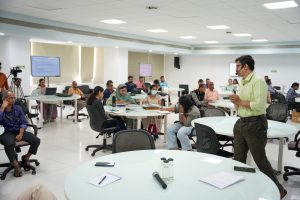 The Teaching Learning Centre(TLC) at SRM University-AP organised a two-day Faculty Training Programme on Teaching Methodologies & Pedagogies. The Faculty training Programme saw resource person Prof. Prasad Edamana from IIT, Madras delivering the session.Vice Chancellor Prof. Manoj K Arora; Associate Director, Dr S Mannathan; Assistant Professor and Co-ordinator, Dr Subeesh N P from the Teaching Learning Centre along with Faculties representing various Departments took part in the session.
The Teaching Learning Centre(TLC) at SRM University-AP organised a two-day Faculty Training Programme on Teaching Methodologies & Pedagogies. The Faculty training Programme saw resource person Prof. Prasad Edamana from IIT, Madras delivering the session.Vice Chancellor Prof. Manoj K Arora; Associate Director, Dr S Mannathan; Assistant Professor and Co-ordinator, Dr Subeesh N P from the Teaching Learning Centre along with Faculties representing various Departments took part in the session.
In his inaugural address Vice Chancellor Prof. Manoj K. Arora stressed on the essential connection between research and teaching within our academic framework. He stated – “Research and teaching cannot be two different verticals, the two should seamlessly intertwine to enhance educational experiences.”
He highlighted the need for the educators to be well-versed in their subject matter in order to improve effectiveness in teaching. He encouraged the teaching community at SRM AP to unite in this endeavour, taking a pledge to collaborate closely with him in order to build an institute of unmatched excellence
Prof. Arora detailed three crucial initiatives aimed at elevating the varsity as a paramount centre for knowledge that fosters the face of a brighter tomorrow : implementing a robust feedback mechanism, establishing a mentor-mentee programme, and promoting familiarity with academic programmes and regulations. He supported his points with case studies that illustrated the benefits of faculty engagement in these areas.
Prof. Prasad facilitated workshops on active learning techniques, including flipped classrooms, problem-based learning, and experiential teaching methods. Faculty members also participated in group activities, where they demonstrated their teaching methods and received detailed feedback from their peers and the resource person.
A significant highlight was the focus on aligning learning outcomes with innovative teaching practices. The participants explored strategies to make classrooms more engaging and inclusive, leveraging technology to enhance both teaching and student interaction.
The training programme concluded with a feedback session where participants shared their takeaways and suggestions for future workshops.
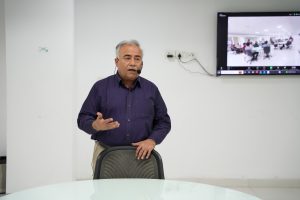
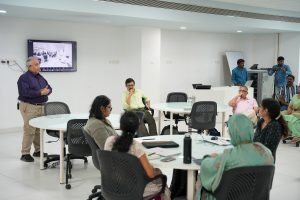
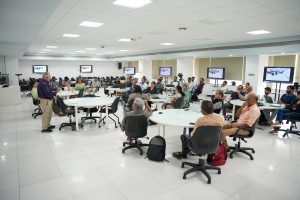
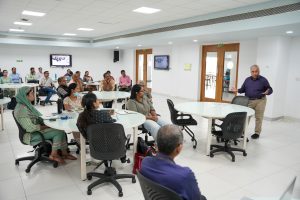
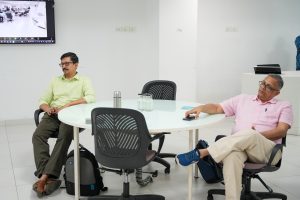
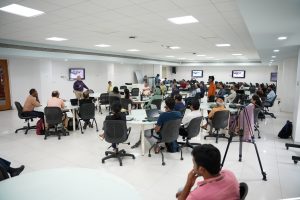
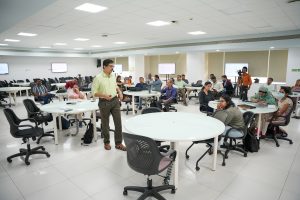
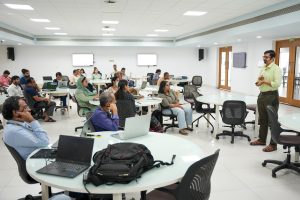
- Published in News, Teaching Learning Centre, TLC


